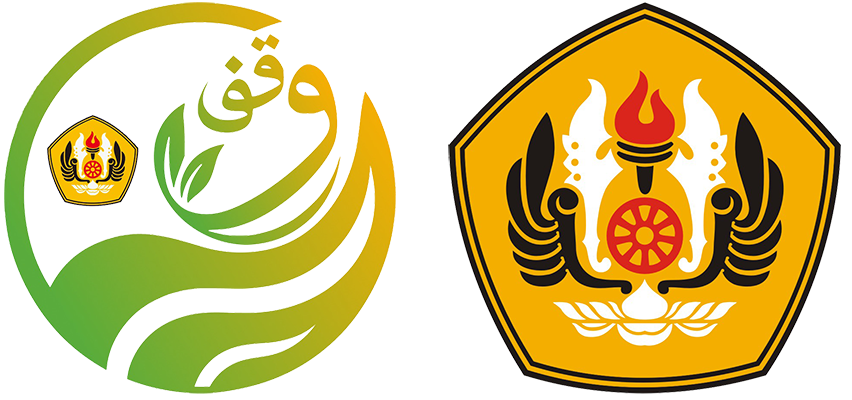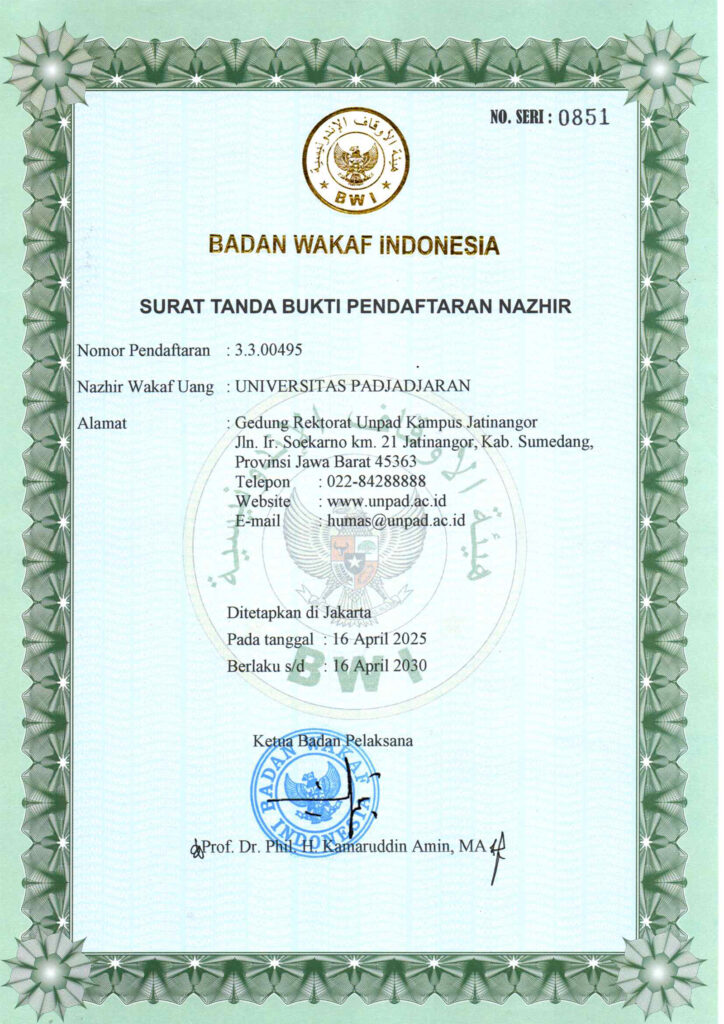As one of the leading universities in Indonesia, Universitas Padjadjaran (Unpad) holds a significant responsibility to enhance the quality of education, research, and community service. Achieving these goals requires strong and sustainable financial resources. Given the limitations in available funding, waqf serves as a strategic solution for providing long-term financial support. This not only enables Unpad to meet the needs of its Tridharma (three pillars of higher education) but also strengthens its role as a university that contributes to national development. Waqf is a component of the funding structure for State University with Legal Entity status, sourced from the public, including all stakeholders of Universitas Padjadjaran, as regulated by Government Regulation No. 26 of 2015 concerning the Forms and Mechanisms of Funding for State University with Legal Entity Status. Therefore, Unpad has established the Unpad Waqf Institution to manage waqf funds in accordance with sharia principles.
In Islam, waqf is not limited to the development of religious facilities such as mosques or Islamic schools (madrasahs) alone. Moreover, it encompasses all forms of assets whose benefits continuously flow to the community, such as educational facilities, hospitals and healthcare services, water wells, productive land, and other social welfare infrastructures. This broader understanding is affirmed by an authentic hadith regarding the waqf made by Umar ibn al-Khattab, who donated his land so that its benefits could be directed to the poor, travelers, and guests. Furthermore, the Prophet Muhammad (SAW) stated that when a person dies, all their deeds come to an end except for three: ongoing charity (sadaqah jariyah), knowledge from which people benefit, and a righteous child who prays for them. Waqf is included as a form of ongoing charity. The Qur’an also commands believers to spend from the best of their wealth (Surah Ali ‘Imran: 92). Thus, waqf is a path to building civilization and an everlasting deed that brings benefit in both this world and the hereafter.
Vision
To become a professional and innovative waqf management center that supports Unpad in becoming a world-class university with a meaningful impact on society.
Mision
- To manage waqf in a transparent, accountable manner in accordance with sharia principles.
- To develop productive and social waqf programs that contribute to enhancing the quality of education, research, and community service at Unpad.
- To establish strategic partnerships with various stakeholders to optimize the benefits of waqf.
- To increase public literacy and awareness of the importance of waqf in sustainable development.
Organizational Structure
| Board of Trustees | : | Prof. Arief S. Kartasasmita, dr., SpM(K)., M.Kes., Ph.D (Ex-officio Rektor) |
| Supervisory Board | : | Prof. Dr. R. Widya Setiabudi Sumadinata, S.Si., S.OP., MT., M.Han (Ex-officio Vice Rector for Resources and Governance) |
| Sharia Supervisory Board | : | Dr. Sofian Al-Hakim, M.Ag |
| Chairperson | : | Prof. Dr. Maman Setiawan, SE., MT (Ex-officio Vice-Rector for Planning, Digital Transformation, Finances, and Business Management) |
| Secretary for Organizational Affairs | : | Yudi Ahmad Faisal, Ph.D |
| Secretary for Legal Affairs and Management | : | Dr. Helza Nova Lita, SH., MH |
| Treasurer | : | Dr. Tettet Fitrijanti, SE., M.Si, Ak., CA., SAS |
| Division Coordinators Risk Management and Social Business | : | Soleh Hidayat, SE., ME |
| Partnership and Fundraising Division | : | Indri Yuliafitri, SE., M.Si., SAS |
| Program Division | : | Nabela Hapsari, SE.Sy., M.Sc., Ibf |
| Community Empowerment Division | : | Cupian, Ph.D |
| Information Technology Division | : | Joval Ifghaniyafi Farras, SM., M.M |
Indonesian Waqf Board (Badan Wakaf Indonesia or BWI) Certificate
Registration Number: 3.3.00495

